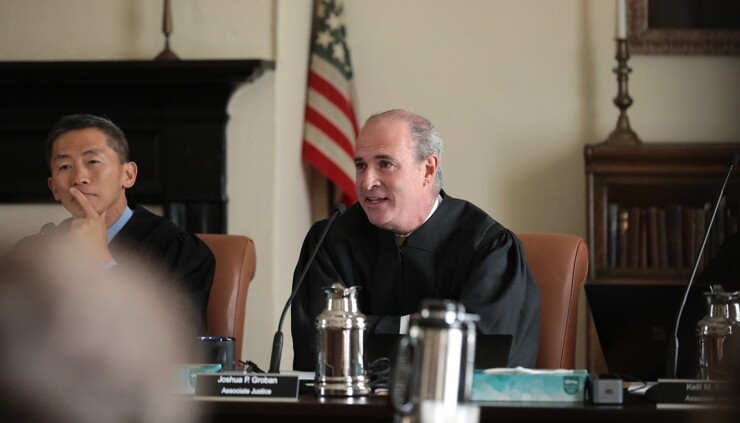
The California Supreme Court
The case, San Jose v. Howard Jarvis Taxpayers Association, hinges on whether the city can issue $3.5 billion in pension obligation bonds to pay toward its unfunded pension liabilities without going to voters for approval.
Allison Burns, a Stradling partner representing the city, reiterated the long-standing argument California governments have used to issue POBs: she said the city does not have to go to voters because pension obligation bonds are not creating new debt. The debt already exists in the form of the unfunded pension liabilities the bonds pre-pay.
The appellate court had agreed with that argument, ruling in favor of San Jose.
Issuers sell taxable POBs to reduce pension liabilities, putting the money into their pension funds with the rationale that interest payments on the bonds will be lower than the assumed return pension funds get on their investments.
But Amy Sparrow, the Howard Jarvis Taxpayers Association's attorney, countered by saying: "This case is not about replacing existing bonds with new bonds of the same definite amount. It is about voluntarily borrowing a large infusion of cash to make new investments."
In 2021, the HJTA, an anti-tax organization,
Facing that challenge, most of the cities walked away from plans to issue POBs, which had
But San Jose, Escondido and Oxnard fought back. All three won at the superior and appeals court levels, but the HJTA appealed the cases to the state Supreme Court.
The high court
The high court limited review of the case to whether the issuance of POBs to pay off unfunded pension liabilities is subject to the voter approval requirement of article XVI, section 18, subdivision (a) of the California Constitution.
In the San Jose case, the Sixth District Appeals Court affirmed a superior court's April 2024 decision, ruling that the state's constitution did not require San Jose to ask voters to approve its plans to issue POBs.
"The transaction does not create debt within the meaning of the debt limit provision, but is a payment arrangement to allow the city to pay off that rather large unfunded liability," Burns said in her oral argument.
She also argued that since maintaining the pension fund in an actuarially sound manner is encoded in the San Jose charter, the city is required to do so, and it's not discretionary.
Justice Joshua Groban questioned whether POBs can, in fact, be considered issuing new debt, because there is a cost associated with issuing bonds, in addition to the interest and principal payments required to pay them off.
Burns responded that the structure of the City Council's resolution on the proposed debt issuance required that no bonds be issued unless savings would be realized by issuing the debt. The interest rates paid on the bonds have to be lower than the assumed rate of return that is used to determine what the city pays to the pension fund, she said.
"The savings wouldn't be certain until the final maturity of the bonds, which could be decades later," Sparrow said. "The bonds have to be issued at interest rates less than the 6.625% assumption rate. If the assumption of savings on the investment of bond proceeds were ironclad, I might agree, but market returns are not guaranteed."
It's currently somewhat of a moot point for cities, because the economics don't allow for the arbitrage necessary to make POBs viable.
The case, at this juncture, is more about preserving the ability to issue the debt in the future without going to voters.
San Jose has also argued that the city is required by city charter to maintain its pension fund in an actuarially sound manner; and it is within the city's discretion to issue POBs if needed to meet that requirement. The trial court had agreed with that argument, Justice Goodwin Liu said.
The HJTA's Sparrow argued that if the city has the "discretion" to issue or not issue the debt, it isn't a requirement, and the city must go to voters.
Previous cases "have erased from the constitution a right which, on its face, seems to allow no exceptions at all," Sparrow said quoting the section of the state constitution that reads, "No local government shall incur any indebtedness or liability in any manner or for any purpose exceeding in any year the income and revenue provided for such year, without the assent of two-thirds of the voters."
She also argued an Orange County pension case held that unfunded pension liability is only an actuarial projection based on a host of assumptions, and therefore not an indebtedness subject to the voter approval requirement.
The Supreme Court has 90 days from the date of oral arguments to file its written opinion. After the opinion is filed, the decision becomes final 30 days later, although the parties can petition for a rehearing during that 30-day window.





